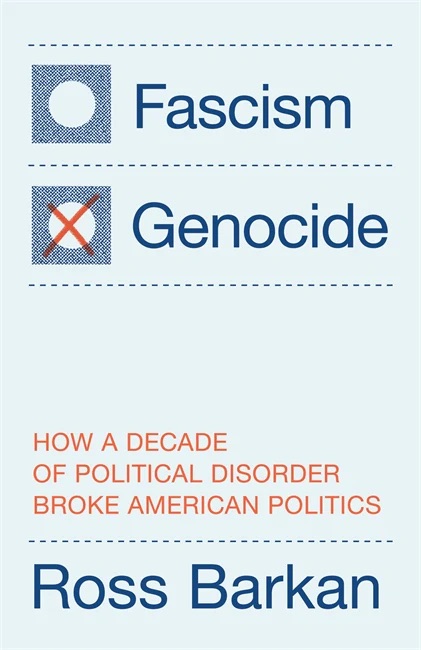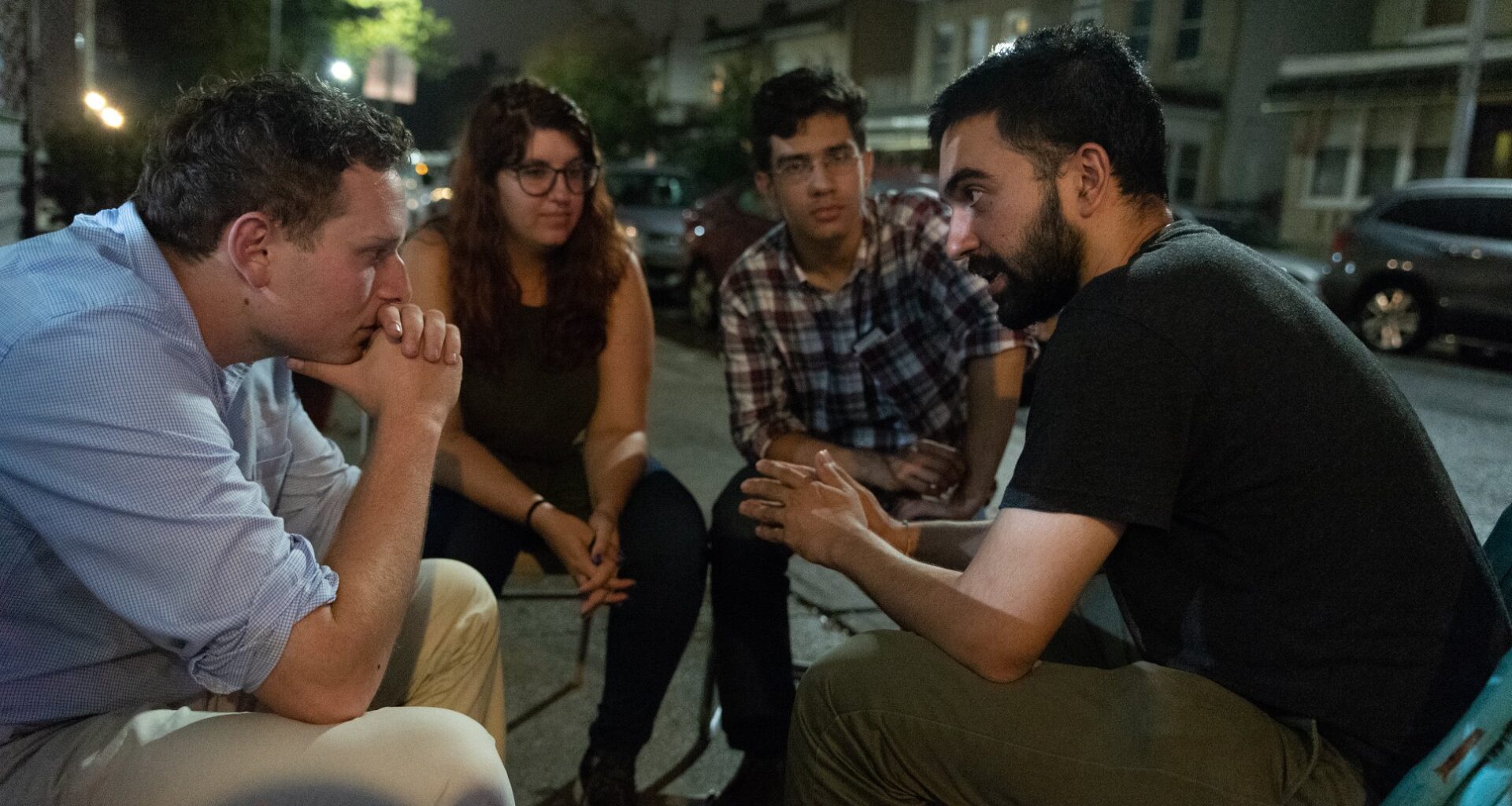The paths and lives of Zohran Mamdani and Ross Barkan are intertwined. Both are outsiders who call New York City home. The Ugandan-born Mamdani—Muslim, faculty brat, and son of a filmmaker—is on the verge of becoming the City’s youngest mayor. Barkan, who is Jewish, grew up in Brooklyn’s Bay Ridge in the shadow of the Verrazzano Bridge, the backdrop for Saturday Night Fever.
Back in the day, Irish and Italian Catholic-Americans filled Bay Ridge’s streets. Once upon a time, pubs hosted Sunday night fundraisers for the Irish Republican Army. The neighborhood now boasts a large Palestinian-American population. The city never sleeps. “New York is not America, but it’s got, quite literally, every part of America,” he blogs.
 Fascism or Genocide:How a Decade of Political Disorder Broke American Politics by Ross Barkan, Verso Books, 208 pp.
Fascism or Genocide:How a Decade of Political Disorder Broke American Politics by Ross Barkan, Verso Books, 208 pp.
Seven years ago, Mamdani managed Barkan’s failed bid for a seat in the New York state legislature. Time presumably heals wounds. Regardless, Barkan was gob smacked by the magnitude of recent Mamdani’s win. “Mamdani’s victory was stunning in its breadth,” Barkan blogs. “Mamdani is now a leader of the American left, along with Alexandria Ocasio-Cortez and Bernie Sanders.”
A regular contributor to The New York Times Magazine and New York magazine, Barkan has a new book, Fascism or Genocide: How a Decade of Disorder Broke American Politics, his third non-fiction book alongside three novels. Barkan’s own loss on the campaign trail has not derailed his arc as journalist or writer.
In Fascism or Genocide, he closely examines the grinding tectonics within the Democratic Party. Generational and ideological fault-lines loudly clang as the calendar barrels toward the midterms. Fascism or Genocide trashes Joe Biden and his enablers. The 46th president’s age and disabilities were visible, yet voters were told to ignore what they saw: an old man with good days and bad days. Democrats and Republicans, both, suffer from delusions.
Most glaring, however, is the title, taken from the aftermath of the brutal October 7, 2023, attack by Hamas on Israel and the ongoing response. For much of the left, the plight of Gaza has become their new rallying cry, surpassing Black Lives Matter and Occupy Wall Street, according to Barkan.
“Palestinian activists themselves tagged Biden ‘Genocide Joe,’ arguing there was little difference between his victory and Trump’s,” he confides.
Things didn’t go as planned. Dearborn, Michigan, which has the largest population of Arab-Americans, voted for Trump, yet the conflict continues without pause. The administration recently approved extensive Israeli military actions in Gaza City, including the displacement of about one million people.
At the same time, support for Israel hemorrhages. Democrats, independents, and younger Americans walk away. Ditto Steve Bannon. Globally, the Jewish State is a candidate for pariah status. Trump, by contrast, remains steadfast. For the record, unlike Joe Biden, he is not a self-declared Zionist.
Back on the page, Barkan continues: “One [activist] told me it was a brutal choice between genocide and fascism.” The author is pained by it all. Here, a voice from the past makes itself heard.
“My late father, a Jew who once lived on a kibbutz in the early 1960s, would always speak of Israel with sadness and resignation,” Barkan volunteers. “He was of a cohort that no longer exists, the socialist Zionist, and over time he retained the former identification without any of the latter.”
“Sweet dreams and flying machines in pieces on the ground,” to quote James Taylor. Reality does bite. Barkan wishes to be insulated from the conflict, but history has a way of catching up. Recent FBI hate-crime statistics say otherwise. Jews top the bureau’s religious victims list.
“I have always had an uneasy relationship with Israel,” he admits.
“Again and again, people like me have been forced to answer for a nation that we are not bound to in any meaningful way; I have never visited Israel and I’m not sure I ever will. To ask an American Jew to account for Israel is not so different than demanding an answer from them for the ongoing crisis in Sudan.”
Ethno-nationalism within the U.S. and notions of “Heritage-Americanism” further complicate his quest. Regardless, the hook brings you back.
Across 200 pages, Mamdani’s name doesn’t appear, but his presence hovers. On Thursday, the Democratic nominee for mayor criticized Andrew Cuomo, the former governor, and Eric Adams, the incumbent mayor, for their empathy deficits toward the children of Gaza. On the other hand, Mamdani lags in criticizing Hamas’s brutality and continues to offer a word salad to explain his failure to condemn the chant, “Globalize the Intifada.” In a word, he expects understanding and dispensation. On Election Day, he may get all that he asks for.
Elsewhere, Barkan lauds authenticity, praises Bernie Sanders, and yawns at Alexandria Ocasio-Cortez. Unlike the senator from Vermont (nee Brooklyn), the congresswoman from the outer boroughs channels identity politics and craves a nexus to the innermost rings of power. It’s not exactly about blue-collar America.
Like most self-professed young democratic socialists, she embraced open borders. “Here, they diverged from both the American working class—unchecked immigration was not popular—and Sanders himself, who had derided the concept of mass migration to the United States,” Barkan writes.
Yes, Sanders and AOC stump together against Donald Trump at the anti-Oligarchy tour, even as the duo holds differing visions. “[H]is particular concerns—single-payer healthcare, raising taxes on the wealthy—were no longer overriding enchantments for the young.”
Instead, it was more important to AOC to defund the police and combat racism amid the COVID-19 summer of 2020 and the aftermath of the murder of George Floyd. For the record, Sanders never bought into defunding the police and backed the 1994 crime bill.
“The democratic socialist is ambitious. She wants to be with a winner. Team players get further in D.C., anyway,” Barkan tartly observes.
By the numbers, the Bronx and Queens, AOC’s turf, went for Kamala Harris but still moved in Trump’s direction by double-digits. Whether any Democrat can regain the confidence of past core constituencies is debatable.
The party of FDR and JFK has transformed itself into the voice of the faculty lounge and “religious nones”. Its nexus to the concerns and mores of workaday America is at times tenuous (Conversely, Trump’s slapping tariffs on everything from coffee to Camrys is unlikely to enhance his working-class hero routine.)
Barkan is acutely aware of the conundrum. He offers a broad prescription that is short on details.
“Democrats will have to compete … for working class and non-college-educated voters, especially in rural areas,” he declares. “It will not mean abandoning small donors or the economic populism that thrills them. It will mean being a tribune for the working class.”
That’s a very tall order. In a world of assortative mating, polarization and politics as a substitute for religion, I wouldn’t hold my breath. It is the rare Democrat who can successfully harness and lead the party’s competing and warring factions. Beyond that, culture counts, a point made by Barkan.
“Culture matters too, and the social justice left never understood that either,” he states as a given. “Cosmopolitan demands don’t work outside of college campuses and corporate boardrooms.” From the looks of things, it is doubtful that Barkan’s advice can bridge the chasm between the urban left and Red America. The U.S. and the Democrats have a problem.
Related

